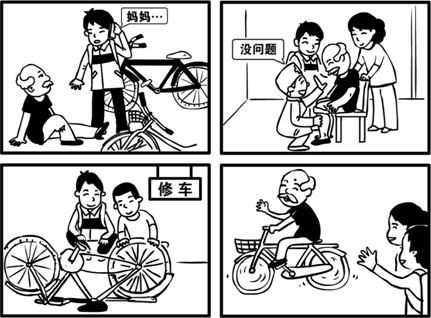题目内容
14.How Many Lies Do the Children Tell You?Mothers who feel their children don't appreciate them can add another grievance to the list:half the time,their children are lying to them.A study designed to expose the truth about lying shows that undergraduates lie to their mothers in 46% of their conversations.Still,mums should feel better than total strangers,who are told lies an astonishing 77% of the time.
Bella Depaulo and a team of psychologists from the University of Virginia,Charlottesville,asked 77undergraduates to keep a record of all their conversations for a week,and write down whether they lied at any time.DePaulo named lying broadly,as"when you intentionally try to mislead someone",so she would catch the smallest of lies.
The students told an average of two lies a day.They said they had been studying when they had been out drinking.One told his parents that a textbook cost 50ratherthan20so that they would send him extra money.Female students constantly told their plain-looking roommates that they were pretty."They are everyday lies,"says DePaulo.
DePaulo and her colleagues conclude that people tend to tell fewer lies to those they feel closest to.College students lied to their best friends 28% of the time but lied to acquaintances 48% of the time.In close relationships,people were more likely to tell"kind-hearted"lies,designed to protect feelings,rather than self-serving lies.
Romantic partners are somewhere between close friends and acquaintances.Students lied to romantic partners about a third of the time.DePaulo thinks that unmarried lovers can expect less honesty than best friends because of the insecurity that comes with romance.
Mothers can take heart from one other finding.They may have been lied to,but at least their children talked to them.The students were recorded telling few lies to their fathers because they had little interaction with them.
54.According to the passage,college students felt closest toB.
A.mothers B.best friends
C.acquaintance D.romantic partners
55.Female students lied to their roommates toD.
A.get money from them B.offer them the services
C.gain more security D.make them happy
56.What is the purpose of this article?A
A.To present a fact. B.To argue an idea.
C.To tell a story. D.To explain a theory.
分析 本文是一篇关于孩子说谎的社会调查研究的说明文.调查发现有一半的时候孩子们会对妈妈撒谎.一项调查显示大学生在46%的会话中会对妈妈撒谎,不过,妈妈们值得欣慰的是这要比陌生人的情况好;在与陌生人的对话中会高达77%.
调查中77名大学生记录了他们一周的对话,并且随时记下他们是否撒谎.并且DePaulo专家对lie进行具体界定.结果发现大学生平均每天撒两个谎.
DePaulo和她的同事得出结论:人们对自己最亲近的人撒谎较少;在亲近的关系中,人们更会撒善意的谎言以保护感情,而非为自己.而情人之间的情况则介于亲密的朋友和熟人之间.
另一项发现也会让妈妈们感到欣慰:孩子们也许会对她们撒谎,但是至少孩子们还会和她们讲.研究发现孩子对父亲撒谎的次数少因为父子之间的交流非常少.
解答 54.B. 本题是细节推断题.根据文章第四段中"DePaulo and her colleagues conclude that people tend to tell fewer lies to those they feel closest to."中可知,关系亲近的人撒谎的次数少;然后根据文章这的数据:第一段中提到就妈妈而言的数据是46%; 第四段提到最好的朋友而言的数据三28%;就熟人而言的数据是48;第五段提到就情人而言是介于关系亲密的朋友和熟人之间,由此判断最好的朋友的数据最小,因此判断答案是B.
55.D. 本题是细节理解题.根据第三段"Female students constantly told their plain-looking roommates that they were pretty.(女性常常告诉她们相貌普通的室友她们很漂亮.)"可以推断,女性这么讲就是为了让对方高兴,所以本题答案选择D项.
56.A.本题是主旨大意题.文章讲述的是一项调查发现,通过具体数据呈现发现的一些客观事实,由此判断答案是A.
点评 做阅读理解时,强调阅读的过程中整体把握;解题的过程中要多用排除法,要对比题干和文章中的具体细节,做到解题时有理有据.

 天天向上一本好卷系列答案
天天向上一本好卷系列答案 小学生10分钟应用题系列答案
小学生10分钟应用题系列答案-_________.( )
| A. | Forget it | B. | Good luck | ||
| C. | That's all right | D. | Congratulations |
- .( )
| A. | Because he lied to me | B. | His lying to me | ||
| C. | He lied to me | D. | Him lying to me |
As soon as I got to my(41)schoolthe next morning I (42)showed off my phone and asked everyone for their(43)number.
It felt like I didn't even(44)existin that class any more.I wouldn't pay much attention to the teachers because I was too busy on my(45)phone.Luckily I didn't get(46)caughtusing it.I was pretty(47)surethat the teacher didn't(48)noticethat I stopped paying attention to her(49)because a week later we took a test and I failed.To make matters(50)worse,my mom had to(51)signthe test.
It was hard to show my mom the (52)paper.She was used to seeing A's and B's on my tests.Well,eventually,I showed her and she couldn't(53)believeit.She was angry but most of all,she was disappointed.
Weeks passed and my parents started to(54)dislikethe fact that I had a phone.They would say,"We have noticed that you never pay attention to us.It's like you have your own little (55)worldnow and we don't communicate as much with your phone."
I acted like they were wrong,but then I started to wonder if it was true that I was spending too much(56)timeon the phone.
A week later I tried(57)goinga whole day without a cell phone and it didn't go that badly.I had so much(58)funbecause I was actually spending time with my family and paying attention to them.From that day,I had a different point of view towards cell phones.
Phones really take you away from the rest of the world.I'm not saying that phones are(59)badand not to use them,but you do have to spare some time to spend with your family and not get(60)stuckwith your phone all day.My phone took away time from my homework and from my family.It also affected my grades.
I will keep using my phone,but I will have it under better control.
| 41.A.office | B.school | C.store | D.home |
| 42.A.took | B.put | C.turned | D.showed |
| 43.A.number | B.name | C.help | D.address |
| 44.A.come | B.hand | C.give | D.exist |
| 45.A.job | B.test | C.phone | D.desk |
| 46.A.caught | B.allowed | C.troubled | D.appreciated |
| 47.A.proud | B.doubtful | C.sure | D.angry |
| 48.A.mention | B.notice | C.prevent | D.punish |
| 49.A.until | B.before | C.though | D.because |
| 50.A.clearer | B.easier | C.worse | D.better |
| 51.A.read | B.sign | C.do | D.make |
| 52.A.box | B.book | C.homework | D.paper |
| 53.A.believe | B.receive | C.see | D.achieve |
| 54.A.ignore | B.dislike | C.accept | D.enjoy |
| 55.A.secret | B.idea | C.world | D.dream |
| 56.A.time | B.force | C.money | D.control |
| 57.A.studying | B.working | C.going | D.thinking |
| 58.A.trouble | B.worry | C.fun | D.improvement |
| 59.A.good | B.bad | C.necessary | D.useful |
| 60.A.interested | B.pleased | C.annoyed | D.Stuck |
 请根据下面提示,写一篇短文,词数不少于50.
请根据下面提示,写一篇短文,词数不少于50.
